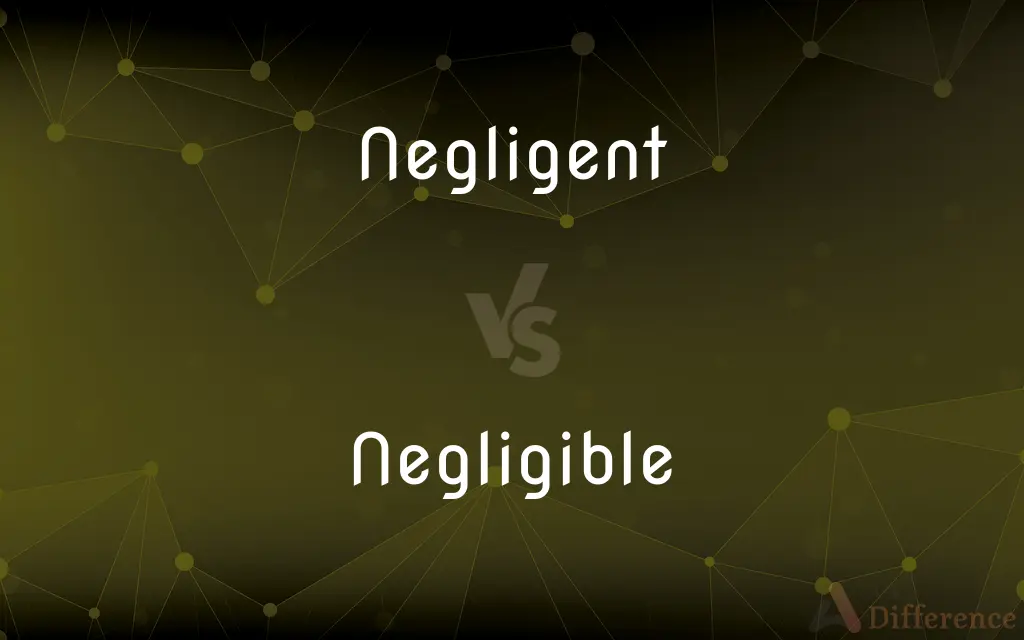Negligent vs. Negligible — What's the Difference?
By Tayyaba Rehman & Fiza Rafique — Updated on May 5, 2024
"Negligent" refers to a lack of proper care or attention, often causing harm, whereas "negligible" describes something so small or unimportant that it can be disregarded.

Difference Between Negligent and Negligible
Table of Contents
ADVERTISEMENT
Key Differences
"Negligent" implies a failure in duty or care that typically results in damage or harm, while "negligible" refers to something minor that has little to no impact. This distinction is important in legal and everyday contexts.
In legal terms, being negligent can lead to liability as it suggests a breach of expected standards of behavior, whereas negligible issues often do not result in any significant consequences or legal culpability.
In terms of effect, a negligent action has noticeable and sometimes severe repercussions, on the other hand, something that is negligible is often so slight that it is easily overlooked or ignored.
When assessing situations in business or health and safety, negligent behavior can lead to serious breaches of policy or even accidents, whereas negligible risks are considered acceptable and manageable.
Understanding whether a situation is negligent or merely involves negligible factors is crucial for effective decision-making and risk assessment in various professional fields.
ADVERTISEMENT
Comparison Chart
Definition
Failing to take proper care in doing something
So small or unimportant as to be not worth considering
Consequences
Can lead to serious harm or legal liability
Minimal impact, often ignored
Usage in Law
Often grounds for liability and compensation claims
Rarely considered in legal judgments
Impact on Decision-Making
Requires immediate attention and rectification
Often overlooked in strategic planning
Common Contexts
Safety regulations, professional duties
Statistical analysis, minor errors
Compare with Definitions
Negligent
Lacking diligence or care.
Negligent handling of the machinery led to a breakdown.
Negligible
So minor as to be not worth considering.
The cost was negligible compared to the overall budget.
Negligent
Failing to provide necessary care.
The doctor was negligent in not diagnosing the illness.
Negligible
Not important or relevant.
The discrepancies were negligible and ignored.
Negligent
Showing a lack of attention.
Negligent behavior by the driver caused the accident.
Negligible
Trivial or insignificant.
The impact on profits was negligible.
Negligent
Careless in fulfilling duties.
He was found negligent in his financial reporting duties.
Negligible
Barely noticeable.
There was a negligible delay in the schedule.
Negligent
Ignoring professional responsibilities.
The engineer was negligent in checking the safety protocols.
Negligible
Minimal effect or importance.
The errors were negligible and did not affect the outcome.
Negligent
Given to or characterized by neglect, especially habitual neglect
The negligent worker missed another deadline.
Negligible
Not significant or important enough to be worth considering; trifling.
Negligent
(Law) Acting with or done through negligence.
Negligible
Able to be neglected, ignored or excluded from consideration; too small or unimportant to be of concern.
We found errors, but their effects were negligible.
Negligent
Careless or inattentive.
Negligible
That may be neglected, disregarded, or left out of consideration; too small or unimportant to be worthy of notice.
Within very negligible limits of error.
Negligent
(legal) Culpable due to negligence.
Negligible
So small as to be meaningless; insignificant;
The effect was negligible
Negligent
Apt to neglect; customarily neglectful; characterized by negligence; careless; heedless; culpably careless; showing lack of attention; as, disposed in negligent order.
He that thinks he can afford to be negligent is not far from being poor.
Negligible
Not worth considering;
He considered the prize too paltry for the lives it must cost
Piffling efforts
A trifling matter
Negligent
Characterized by neglect and undue lack of concern;
Negligent parents
Negligent of detail
Negligent in his correspondence
Negligent
Marked by insufficient care or attention;
A negligent housekeeper
Negligent about personal cleanliness
Common Curiosities
Can a negligent act be negligible in its effects?
Typically, a negligent act has significant effects; it is rarely negligible as negligence implies a breach of duty that leads to notable consequences.
What does it mean to be negligent?
Being negligent means failing to take proper care or attention that is required, often resulting in harm or damage.
What factors make a risk negligible?
Factors include the low likelihood of occurrence and minimal potential impact.
How is negligible different from insignificant?
"Negligible" often implies an even smaller degree of importance than "insignificant", suggesting almost no impact at all.
Why might a business ignore negligible risks?
Businesses might ignore negligible risks because their impact on operations or finances is minimal.
What is the threshold for something to be considered negligible?
The threshold varies by context but generally involves impacts that are minimal and do not warrant significant consideration or action.
What types of negligence are there?
There are several types, including gross negligence, which involves a greater disregard for safety or duties.
How do professionals mitigate negligent risks?
Professionals mitigate negligent risks by adhering to established protocols, continuous training, and diligent practice.
Is it possible for an error to be both negligent and negligible?
While an error can be made through negligence, if its effects are negligible, the negligence might not lead to serious consequences.
How do courts determine if an act was negligent?
Courts look at whether the standard of care expected in the circumstances was not met and if this failure led to harm.
Can negligence be excused if the harm is negligible?
Negligence generally focuses on the breach of duty, not the magnitude of the harm, though minor harm might lead to lesser penalties.
Share Your Discovery

Previous Comparison
Assume vs. Resume
Next Comparison
Comprehension vs. InterpretationAuthor Spotlight
Written by
Tayyaba RehmanTayyaba Rehman is a distinguished writer, currently serving as a primary contributor to askdifference.com. As a researcher in semantics and etymology, Tayyaba's passion for the complexity of languages and their distinctions has found a perfect home on the platform. Tayyaba delves into the intricacies of language, distinguishing between commonly confused words and phrases, thereby providing clarity for readers worldwide.
Co-written by
Fiza RafiqueFiza Rafique is a skilled content writer at AskDifference.com, where she meticulously refines and enhances written pieces. Drawing from her vast editorial expertise, Fiza ensures clarity, accuracy, and precision in every article. Passionate about language, she continually seeks to elevate the quality of content for readers worldwide.













































